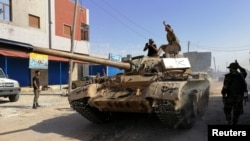The World Health Organization says it is rushing lifesaving medical supplies to hospitals in and around the Libyan capital, Tripoli, as fighting intensifies and moves toward the center of the city.
The United Nations says the civil conflict has displaced more than 8,000 people — nearly half of them in the last 48 hours. Health facilities near Tripoli report at least 323 wounded and 75 dead, according to the World Health Organization.
However, U.N. humanitarian aid is not being flown into the Tripoli airport, which has been hit by airstrikes.The WHO representative in Libya, Syed Jaffar Hussain, says his agency is looking for alternative ways of getting critical medical supplies into the country.
In the meantime, he says the WHO has pre-positioned supplies in three strategic locations.Talking on a telephone from Tripoli, he told VOA there are enough supplies for two to three weeks, when he expects the crisis will peak in the city.
"Looking at the intensity of the conflict, we have a contingency plan for accommodating more and more IDPs [internally displaced persons] or expecting more and more IDPs in the thousands, if not in hundreds of thousands, in the next few days," Hussain said.
WHO is considering shipping supplies from its hub in Brindisi, Italy, or using the World Food Program's humanitarian helicopter service to airlift supplies in an emergency situation.
Hussain said the highest priority is for trauma care supplies needed to respond to severe casualties. Patients with chronic illnesses usually are overlooked in crisis situations such as this, but the WHO considers it essential to provide chronic medication for people suffering from life-threatening illnesses, such as diabetes.
A major problem facing Libya is the large number of migrants who come from countries where tuberculosis and HIV is highly endemic, Hussain said, adding the WHO will have to bring in large supplies of drugs to treat those illnesses.





